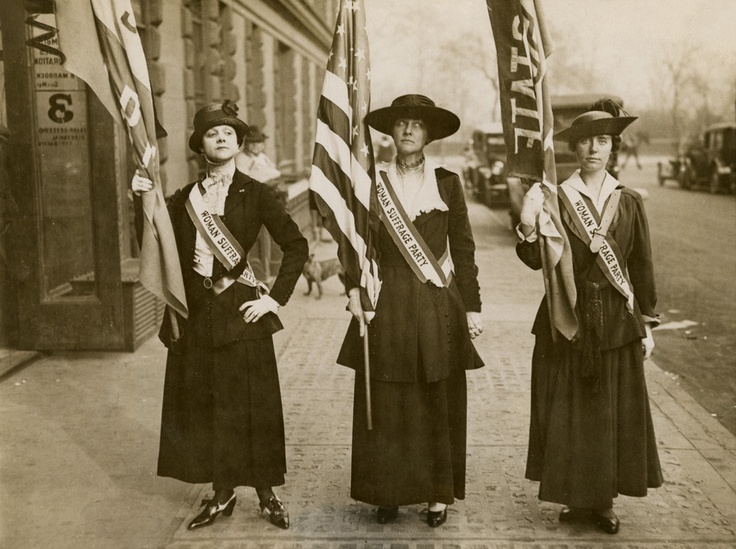by Carol Carpenter
for the “Progressive Views” column, Boerne Star, August 14, 2020

In 1620, 41 male Puritans of Plymouth Colony signed the Mayflower Compact, setting the new country on the path for the American experiment of self-rule. Notably, the women of the Mayflower were not asked for their input or their signatures. Under the influence of Puritanism and Calvinism, women’s status declined to the point where they were victims of witch-hunts and subject to being burned, drowned or hanged. The ensuing years saw the horrors of the witch-hunts dispensed with, but colonial women had few citizenship rights.
The words about all men being created equal and endowed with unalienable rights, in Jefferson’s Declaration of Independence, really did mean men and not women. Our ancestors fought the American Revolution, in part, because of taxation without representation. Their right to have a voice in government was of such importance that our forefathers risked their fortunes and their lives to traverse that thin line between revolutionary hero and British traitor. Our citizen soldiers fought the British and won. American women lost their right, under British law, to vote if they were property owners. During the Continental Congress, Abigail Adams’ advice to her husband echoed the same objective that drove the men to revolution: “We are determined to foment a rebellion and will not hold ourselves bound by any laws in which we have no voice or representation.” Her advice was ignored then, and again at the Constitutional Convention.
In 1848, 30 years after Abigail’s death, women began her revolution at the Seneca Falls Convention chaired by suffragists Lucretia Mott and Elizabeth Cady Stanton. Women’s rights were the issue; but after discussion, it was decided these could not be attained without first gaining the vote. The battle was joined by suffrage movement icons Susan B. Anthony, Lucy Stone, Carrie Chapman Catt, Alice Paul, Jeannette Rankin, and others.
Many citizens and the majority of newspapers ridiculed and vilified the suffragettes. The women experienced physical violence and some were jailed under horrible conditions. Their hunger strike while in jail brought on forced feedings. Hard to believe, for those of us who exercise the franchise in today’s elections, that even women opposed the movement to gain the vote.
After the Civil War, Congress adopted the 15th Amendment, giving the vote to “all citizens regardless of race, color or previous conditions of servitude.” “All citizens,” once again, did not mean women. In this situation, Susan B. Anthony said it best: “Men, their rights and nothing more; women their rights and nothing less.” These brave women soldiered on with other younger women joining their ranks as one century became another without women being allowed to vote. Finally, in 1919, the issue of votes for women was again in the headlines.
I inherited my grandfather’s news article dated 16 February 1919, written by the president of the Farmer’s Union, who expressed his desire to “provoke an intelligent discussion of woman suffrage.” The article is a microcosm of every argument made in favor of the subjugation of women. The article read (in part): “Why is woman dissatisfied: Is it not a sufficient political achievement for woman that future rulers nurse at her breast, laugh in her arms and kneel at her feet? Can ambition leap to more glorious heights than to sing lullabies to the world’s greatest geniuses, chant melodies to master minds..?” “Angels and Messages: God Almighty gave Eve to Adam with the pledge that she would be his helpmate; and now, she proposes to provoke God and decoy man by amending an agreement of which she was not a party.” It Is Woman’s Fault: “It is she who is at fault for most of the sin and suffering in this world. Let woman solve her own problems before invading the domain of man.”
Congress passed the 19th Amendment in 1919. At this point, three-fourths of the states needed to ratify the Amendment for it to become law. On 18 August 1920 in the Tennessee legislature, 24-year-old Harry Burn, remembering the words of his mother, “Do right by the women,” cast his vote for the 19th Amendment. It passed by one vote in Tennessee, the 36th state needed for ratification.
One woman, Charlotte Woodward, who attended the Seneca Falls Convention at the age of 19, was the only participant still alive to cast her vote, at the age of 91, in 1920! Even though women won the vote, my grandfather did not personally ratify this amendment. In the 41 years between 1920 and her death, my grandmother never got to vote.



